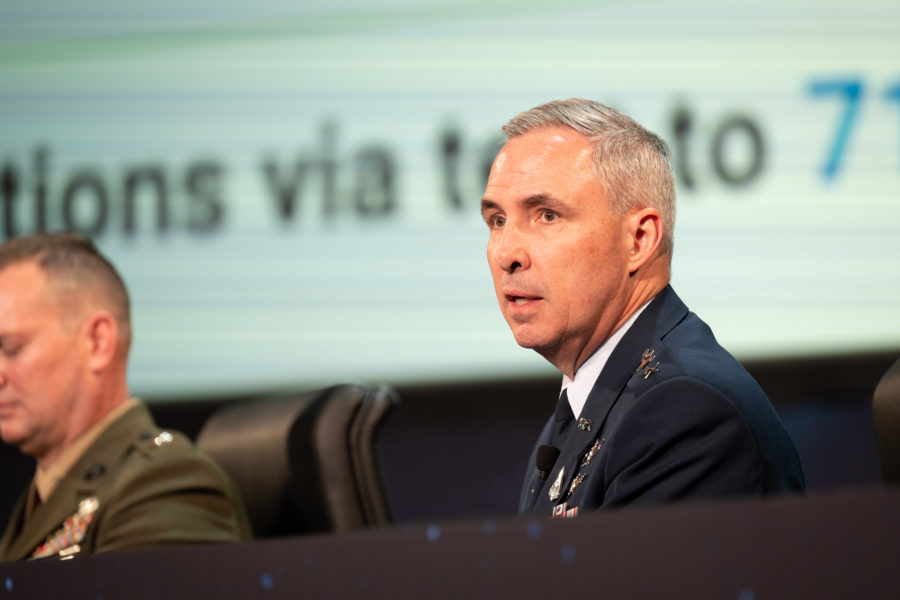The Space Force does not fully understand its cyber threats, and cybersecurity is an overlooked vulnerability of space operations, one of the service’s top leaders said Oct. 14.
“We have to be cyber secure in everything we do,” Lt. Gen. Stephen N. Whiting, head of Space Operations Command (SpOC), said during a virtual event hosted by the Center for Strategic and International Studies. “That’s really the soft underbelly of these global space networks.”
Whiting said the U.S. military has long understood its vulnerabilities as physical ones. It engages in intelligence to detect threats but can also rely on basic defenses at installations, such as fencing and armed security to fall back on. But cybersecurity is more amorphous than physical security, he said.
“We don’t yet have the intuitive understanding to say, based on the threat that we’re seeing, ‘Have we done enough?'” said Whiting, who also heads the USSF element of U.S. Space Command (SPACECOM). “I don’t want to act like we don’t have any of those tools, but it’s not the same comprehensive understanding we have for physical security.”
Viewing space as a contested environment, the Space Force and civilian branches of the U.S. government have acknowledged material threats to space operations, condemning anti-satellite tests and working to reduce the number of objects in Earth orbit. Vice Chief of Space Operations Gen. David D. Thompson has said the number of objects in space could become “unmanageable.” With the increase, the Commerce Department is taking over some of the Department of Defense’s role in space traffic management, and the Federal Communications Commission (FCC) will require operators to deorbit defunct satellites within five years.
Cyber threats, however, are largely invisible until they become a problem. In addition, cybersecurity tools can seem intrusive rather than viewed as a practical necessity. The U.S. is also seeking to connect all its military operations further and to expand data sharing, growing risks to networks by increasing entry points.
“We’re working to improve our cyber capabilities to defend those operations,” Whiting said. “The joint force cannot fight the way they want to fight without the space capabilities we provide to all levels of conflict.”
American adversaries such as Russia and China engage in cyberattacks against other countries, including the United States. The threat is ongoing. More than a dozen U.S. airports had their websites knocked out Oct. 10 in an attack claimed by a pro-Russian hacker group.
The Space Force is not the only U.S. service that conducts cyber operations, nor is it the only service that views cyber threats as one of the most significant issues they must address.
“This really is a global problem,” said Lt. Gen. Laura A. Potter, Army deputy chief of staff for intelligence, said at the Association of the United States Army conference Oct. 12.
“We really need to pay attention to this,” added Lt. Gen. Maria B. Barrett, head of Army Cyber Command. “We need to pay attention now.”
Air Force leaders have also acknowledged vulnerabilities.
“There’s been a realization that, quite frankly, we can’t protect everything we have,” said Brig. Gen. Chad D. Raduege, the chief information officer of U.S. European Command, at an AFA event in March.
However, the Space Force sees itself as having a broader responsibility to the U.S. government and the general public, which rely on it to conduct day-to-day operations. Disruptions in a Space Force network could have wide-ranging implications for the rest of the U.S. military. As well as relying on intelligence and surveillance to recognize threats, the Space Force is also working on adding cybersecurity to its networks.
“Today we invest in cybersecurity at the weapon system level that we’re putting that in, although we do have legacy systems that were built before this was a consideration,” Whiting said. “We’re trying to bolt on cybersecurity there. We’re building Mission Defense Teams of Guardians who are actively monitoring our systems in the cyber domain. We’re building in higher-level security as well, where we’re looking at overall networks and what kind of activity is on those networks.”
Ultimately, the Space Force views better cybersecurity as necessary for its role enabling operations by the rest of the U.S. military.
“That’s really our moral responsibility to the joint force,” Whiting said.
